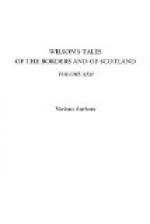“A lady called in the dusk,” he said, “and inquired if it was true you were here. I told her it was.”
“And what more?” asked the youth, as he started out of his day-dream. “But, stay—what like was she?”
“I could scarcely see her,” replied the man; “middling tail, rather young, as I thought—with a veil, through which I could see a pair of pretty, bright eyes.”
“Were they like diamonds?” cried the student, absolutely forgetting that he was speaking to an ordinary mortal about very ordinary things.
“Ha, ha! I never saw diamond eyes,” answered the jailer; “but I’ve seen glass ones in a doll’s head looking very bright. Why, you ’aven’t got mad, like some of the chicken-hearted birds in our cage?”
“Yes,” cried the youth, “I’m frantic-mad; but stay, have patience. Did she want to see me?”
“Yes, she asked if she could; but when I told her she might, she seemed to get afeared to come into a jail, and said she would call again to-morrow night at the same hour.”
“Can you tell me nothing more of what she was like?—not she who was here this evening?”
“Why, no; don’t you think I know her kind? Oh, we see many o’ them. They stick closest to the unfortunate, but ’tis because they are unfortunate themselves. Common thing, sir. Never feel for others till we have something to feel for ourselves. The visitor is a lady, sir.”
“Can you tell me nothing more?” said the student eagerly. “How was she dressed?”
“A large, elegant cloak, sir; can scarcely say more.”
“Was it trimmed with fur?”
“Not sure; but now, when I think, there was some lightish trimming—I mean lighter than the cloak.”
“And the bonnet?”
“Why, I think velvet; but you’ll maybe see her yourself to-morrow. The like o’ her may do you good. The unfortunates who stick so close to the unfortunate do no good—they’re a plaster that don’t cure.”
“It is Maria!” ejaculated Dewhurst, as the jailer shut the door. “She feels for me, and has come in spite of her hard-hearted brother. Her diamond eyes are of another kind. They speak wealth, and love to bestow it. Her fortune is her own, and with that I may yet turn that wayward destiny, and laugh at my persecutors.”
That ray of hope, illuminating his soul, changed almost in an instant the whole tenor of his mind. It might be compared to a stream of nervous energy, emanating from the brain, and shooting down through the network of chords, confirming convulsed muscles, and; imparting to trembling members consistency of action and graces of motion. His reveries were scared by it, as owls under the influence of a sunbeam, and retreated into the dark recesses from which they had been charmed by the enchantment of despair. The personages of these visions were no longer avengers, casting upon him the burning beams of the diamond eyes. They were hopeful, pitiful; the flatterers and fawners were at their old work again, and Pleasure, with her siren face, smiled blandishments on him. Then he would justify the favours of the heaven he made for himself. He would be a logician, for once, in that kind of dialectics called the “wish-born.”




